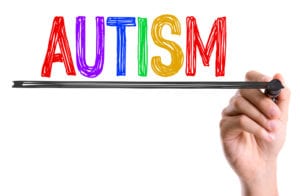Written by Joyce Smith, BS. A comprehensive nutritional and dietary intervention significantly improved nutritional status, non-verbal IQ, autism symptoms, and other symptoms in the majority of sixty-seven participating children and adults with autism spectrum disorder.
 Autism spectrum disorder, a complex developmental disorder affecting one in sixty-eight children, is commonly characterized by certain repetitive behaviors and difficulties with social interaction and communication 1. Its severity can vary greatly 1. While some children and adults with ASD are fully able to perform all activities of daily living, others require substantial support to perform basic activities 1-3. Studies have suggested that children with ASD often lack sufficient lactase and other digestive enzymes, may have poor diets and food sensitivities, particularly to gluten and casein, and thus may benefit from digestive enzymes and healthier diets, including gluten-free, casein-free, soy-free (GFCFSF) diets 4,5.
Autism spectrum disorder, a complex developmental disorder affecting one in sixty-eight children, is commonly characterized by certain repetitive behaviors and difficulties with social interaction and communication 1. Its severity can vary greatly 1. While some children and adults with ASD are fully able to perform all activities of daily living, others require substantial support to perform basic activities 1-3. Studies have suggested that children with ASD often lack sufficient lactase and other digestive enzymes, may have poor diets and food sensitivities, particularly to gluten and casein, and thus may benefit from digestive enzymes and healthier diets, including gluten-free, casein-free, soy-free (GFCFSF) diets 4,5.
Based on a plethora of vitamins and mineral therapies that have been individually researched (over 150 published studies) 6, researchers hypothesized that a combination of nutritional and dietary interventions could effectively reduce the symptoms of autism, including the many gastrointestinal issues, and increase the level of overall functioning. In a 12-month randomized, controlled, single-blind study 7, 67 autistic children and adults residing in Arizona, ages 3-58 years, and 50 non-sibling neurotypical controls were initially given a vitamin/mineral supplementation with the following additional treatments sequentially added :
- Day 30- Essential fatty acids: ProEFA-Xtra by Nordic Naturals (Each capsule contains: 609 mg omega-3 fatty acids (425 mg EPA, 110 mg DHA, 74 mg other omega-3 fatty acids), 198 mg omega-6 fatty acids (including 128 mg GLA), and 15 mg omega-9 fatty acids. Dosage was adjusted for body weight.
- Day 60- Epsom salts (Magnesium sulfate 2x/week, 20 min warm bath with 2 cups Epsom salt and a half cup baking soda)
- Day 90- 50mg acetyl-L-carnitine/kg bodyweight/day, to a maximum of 2 gm/day
- Day 180-Comprehensive digestive enzyme complex for digesting food proteins
- Day 210- Healthy, casein-free, gluten-free, soy-free diet
- Day 365- Assessment of autism severity and overall functioning status. Blood and urine biomarkers, C-reactive protein, homocysteine-related metabolites, handgrip strength, autism severity and overall functioning assessments were analyzed.
Relative to the non-treatment group, the treatment group demonstrated significant improvements in the following areas:
- Non-verbal intellectual ability based on blinded clinical assessment p=0.009
- Autism symptoms p=0.03 and p=0.04 and developmental age-based on semi-blinded assessments
- Increases in EPA and DNA (p=1×10-9), L-carnitine (p=0.03) but not in acetyl L-carnitine , vitamins A, B2 (p=0.00000002), B5 (p=0.0002), B6 (p=0.0000006), B12(cyanicobalamin only) (p=0.006), folic acid (p=0.02) and reduced form of coenzyme Q10 (p=0.001)
- Increases in selenium (p=0.001) and chromium (p=0.05) in red blood cells
Homocysteine significantly decreased in the treatment group (p=0.00002) and C-reactive protein did not differ between the two groups.
Overall, based on the study results, a comprehensive nutritional and dietary intervention is safe and effective at improving nutritional status, non-verbal IQ, autism symptoms, and other symptoms in most individuals with ASD. Vitamin and mineral supplementation and essential fatty acids appeared to have the most clinical benefit for some individuals. Based on the data, better absorption may occur with L -carnitine than with acetyl-L-carnitine in this group of patients. In addition, larger doses of vitamins and/or more bioavailable forms of vitamins are needed to significantly affect blood levels and perhaps provide a greater therapeutic effect. Interestingly, parents found the vitamin/ minerals, essential fatty acids and HGCFSF diet to be the most beneficial.
Source: Adams JB, Audhya T, Geis E, Gehn E, Fimbres V, Pollard EL, Mitchell J, Ingram J, Hellmers R, Laake D, Matthews JS, Li K, Naviaux JC, Naviaux RK, Adams RL, Coleman DM, Quig DW Comprehensive Nutritional and Dietary Intervention for Autism Spectrum Disorder-A Randomized, Controlled 12-Month Trial. Nutrients. 2018 Mar 17;10(3). pii: E369. doi: 10.3390/nu10030369
© 2018 by the authors. Licensee MDPI, Basel, Switzerland. Creative Commons Attribution (CC BY) license (http://creativecommons.org/licenses/by/4.0/)
Click here to read the full text study.
Posted March 28, 2018.
Joyce Smith, BS, is a degreed laboratory technologist. She received her bachelor of arts with a major in Chemistry and a minor in Biology from the University of Saskatchewan and her internship through the University of Saskatchewan College of Medicine and the Royal University Hospital in Saskatoon, Saskatchewan. She currently resides in Bloomingdale, IL.
References:
- Li Y-J, Ou J-J, Li Y-M, Xiang D-X. Dietary Supplement for Core Symptoms of Autism Spectrum Disorder: Where Are We Now and Where Should We Go? Frontiers in psychiatry. 2017;8:155.
- Cekici H, Sanlier N. Current nutritional approaches in managing autism spectrum disorder: A review. Nutritional neuroscience. 2017:1-11.
- Gogou M, Kolios G. The effect of dietary supplements on clinical aspects of autism spectrum disorder: A systematic review of the literature. Brain and Development. 2017;39(8):656-664.
- de Magistris L, Picardi A, Siniscalco D, et al. Antibodies against food antigens in patients with autistic spectrum disorders. BioMed research international. 2013;2013.
- Iovene MR, Bombace F, Maresca R, et al. Intestinal dysbiosis and yeast isolation in stool of subjects with autism spectrum disorders. Mycopathologia. 2017;182(3-4):349-363.
- Adams J. Summary of Dietary, Nutritional, and Medical Treatments for Autism – based on over 150 published research studies. Autism Res Inst Publ. 2013;41:1-53.
- Adams JB, Audhya T, Geis E, et al. Comprehensive Nutritional and Dietary Intervention for Autism Spectrum Disorder—A Randomized, Controlled 12-Month Trial. Nutrients. 2018;10(3):369.
